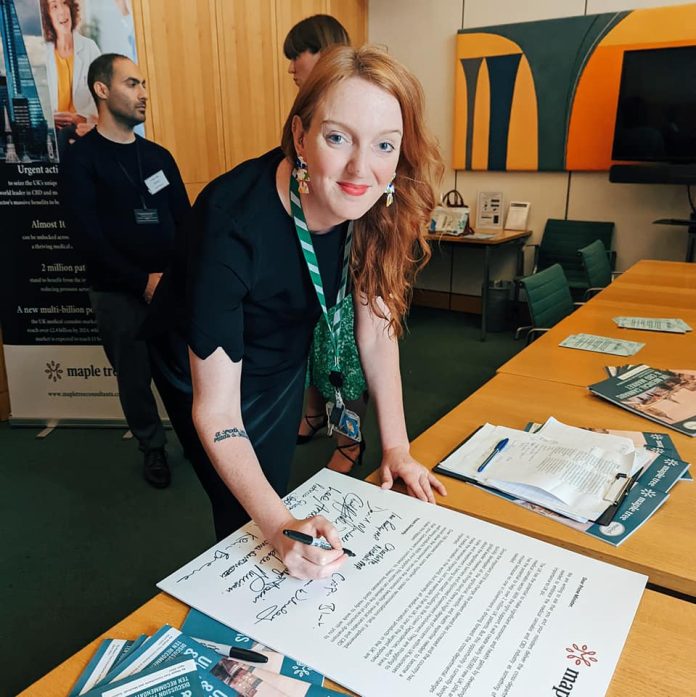Charlotte Nichols, Labour MP, is no stranger to the harsh realities of mental health struggles. As a public figure, she has spoken about her personal battles with PTSD. Today, we delve deeper into her fight for rescheduling psilocybin in the UK, a compound found in “magic mushrooms” which has shown significant promise in treating mental health disorders like PTSD and depression.
Charlotte Nichols psilocybin journey
Nichols vividly recounts her journey of discovery towards psilocybin’s potential as a treatment for PTSD.
Her curiosity was first piqued while reading Michael Pollan’s “How to Change Your Mind,” a best-selling book that delves into the world of psychedelics and their potential therapeutic benefits.
“There was a lot of hype around it, and I found it incredibly interesting,” Nichols said.
Despite her initial scepticism given her non-scientific background, an encounter with a nurse specialising in psychedelic-assisted nursing at the psychiatric ward she was admitted to, piqued her interest further.
The nurse, sporting a mushroom pendant necklace, had recently completed a Master’s degree in this novel field in Ireland.
“My conversations with her and my consultant confirmed that it wasn’t all just hype. He even told me, he could recommend a place in Seattle where psilocybin therapy could potentially cure my PTSD,” Nichols recounted.
She realised that, despite potential benefits, the legality of these treatments, or lack thereof, was a significant barrier in the UK.
With a cheeky wink, her consultant added, “It’s up to the politicians to change it.”
Dealing with parliamentary inertia
A series of conversations with various stakeholders confirmed broad consensus within the medical community, from psychiatrists to neurologists, about psilocybin’s potential.
But the challenge lies in “getting it over the line,” as Nichols puts it.
Armed with her first-hand experiences of mental health struggles and armed with knowledge of this promising treatment, Nichols has decided to try to push for change.
A discussion with Crispin Blunt, another MP, revealed shared frustrations about the difficulties faced in getting psilocybin reclassified as a Schedule II drug.
According to Nichols, the chief obstacle seems to be bureaucratic inertia.
She mentioned the ongoing, seemingly never-ending review into granting Schedule II research rights to Schedule I substances as an example.
“It’s unbelievably frustrating,” Nichols admitted. “This is actually very straightforward. All they would need is a letter from the Chief Medical Officer recommending psilocybin be moved into Schedule II, and it could be actioned basically tomorrow. Crispin and I have already drafted the statutory instrument that they would need to sign to do that.”

Despite this simplicity, the bureaucratic hurdles have proved frustrating.
As Nichols points out, the recent budget proposed changes that would automatically approve any drug licensed in the US, Singapore, Japan, or Germany for use in the UK.
With the FDA widely expected to approve psilocybin for medicinal use next year, Nichols argues that waiting for the Americans to make a decision is not the way forward.
She feels strongly that UK decision-makers should take the initiative, especially given that there is significant support for psychedelic therapy among the populace, including veterans, mental health advocates, and parents of young people with mental health issues. “Why are we just waiting for the Americans to make the decision to move here when we could proactively make this decision?” Nichols asked.
Charlotte Nichols: Supporting a progressive drug policy
Nichols acknowledges the failure of the war on drugs and stressed the importance of addressing addiction and substance misuse with care and understanding.
Drawing from personal experience, she highlighted the detrimental impact of current drug laws on individuals and families. Nichols stated, “I’ve had family members who’ve had issues with heroin addiction, including a cousin who lost his life when I was in my teens.”
She emphasised that criminalisation and stigmatisation only perpetuate cycles of addiction and hinder access to support systems.
Nichols argues for a society-wide conversation about a better path forward and expressed hope that the SNP’s proposals would prompt meaningful discussions on drug reform. “We need to have a proper, sensible conversation as a society about what a better path looks like. And hopefully these proposals from Scotland will be part of forcing that because we’re long overdue,” she stated.
As a member of the Labour Party, Nichols discussed the potential for drug reform under a Labour government.
While ongoing policy discussions and the development of the party’s manifesto shape their stance, Nichols expressed optimism that under a Labour government, changes such as the rescheduling of psilocybin could be realised. She added, “If this government doesn’t get around to doing it then hopefully we will when we drop-kick them out of office.”
When questioned about the possibility of the UK following in the footsteps of Australia legalising psilocybin for therapeutic use or Oregon in legalising psilocybin recreationally, Nichols revealed her plans to visit Oregon in October or November to engage in discussions with state representatives.
She recognised Oregon as a leading state with an evidence-based approach to drug policy.
Nichols also emphasised the importance of evidence in countering long-standing misconceptions surrounding psychedelics.
Nichols acknowledged the public’s apprehension and the embedded moral panic surrounding psychedelics, explaining, “There’s been a kind of moral panic whipped up for the last 70 years around these things.”
She recognises the need to address public fears and debunk misinformation through data and evidence.
Nichols believed that showcasing successful policies implemented in other regions, such as Oregon, could help assuage concerns and pave the way for progressive drug reform.
Charlotte Nichols remains committed to the fight for rescheduling psilocybin, advocating for a proactive, instead of reactive, approach to legislation.
For her and many others suffering from mental health conditions, the potential benefits of psilocybin are a beacon of hope worth fighting for.


